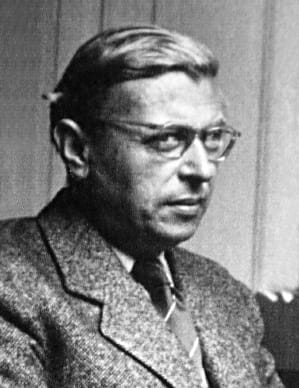Modern Existentialism is the Rejection of Modernity's Extreme Essentialism
Modernity is rejection of the Tao (the "Great Rejection"). Existentialist movements throughout the past 200 years have rejected the rejection . . . and proven wildly popular.

September, 1945. Paris.
Jean-Paul Sartre and his friends started a new journal, The Modern Times, which challenged writers to commit to action.
Shortly later, Sarte was scheduled to give a public lecture. The lecture wasn't well advertised and Sartre was a dry academic, but when he arrived, the place was so packed and the crowd outside so unruly that Sartre, upon arriving, feared it was a Communist Party demonstration. People were frantically trying to get in. Only celebrities were allowed to pass. Sartre's friends had to force an entrance for Sartre. Inside, women fainted; chairs were smashed.
Existentialism had arrived as a popular philosophical movement.
Sarte had become an instant celebrity. He received enormous press coverage, with newspapers printing thousands of his words despite an ongoing paper shortage after World War II.
He became arguably the biggest philosopher of the twentieth century.
Certainly no philosopher this century has had so direct an impact on the minds and attitudes of so many human beings, especially young people, all over the world. Existentialism was the popular philosophy of the late 1940s and 1950s. His plays were hits. His books sold in enormous quantities, some of them over two million copies in France alone. Paul Johnson, Intellectuals.
Existentialism is the Opposite of Essentialism
Essentialism says we know humans by the characteristics bestowed by God or nature. Existentialism says humans make their own characteristics.
Soren Kierkegaard had founded existentialism a hundred years earlier, but Sartre popularized it.
The thing is, no one seems to know what exactly "existentialism" is.
At its most tautological, it's a philosophy that opposes "essentialism."
Essences are those things that define a class of things. If you find the thing that distinguishes one class from another, you’ve found its essence. For the class “elephant,” that thing might be its trunk. Once you discern a trunk, you identify the existence of an elephant.
Essences, in other words, are fundamentally definitional. They define a thing's nature, which in turn allows us to classify things. If you have Essence X, you are expected to look like, behave like, a thing with Essence X. You are, in other words, to be like a thing with Essence X.
Western philosophy had pretty consistently held that, when it comes to human nature, essence is logically prior to existence. If something ("A") is logically prior to something else ("B"), that means you need to know A before you can know B. You can't, for instance, know what a touchdown (B) is without first knowing what the game of football (A) is.
The Western philosophical tradition held that humans have a fixed nature and definitions that we are born into. We are rational, are sociable, have emotions, and so on. When you were created as a human, you were cast into a pre-existing mold, so to speak, about what it means to be human. Without the mold, there is nothing for you to be, so essence is prior to existence.
Extreme existentialists like Sartre disagreed. They said we are thrown into existence without essence or definition. As a result, we are free to make and define ourselves however we want, primarily through action. (Click here for a brief summary of Sartre's thought.)
I say "extreme existentialists" disagreed because there were a lot of existentialist thinkers and authors who never embraced such an extreme position, but they did reject extreme existentialism's opposite: extreme essentialism.
Extreme Essentialism is the Rejection of Two-Thirds of the Reality Spectrum
The Tao denied and existence ignored.
The Reality Spectrum consists of three parts: The Tao, Essence, Existence.
Modernity's reality spectrum came to consist solely of Essence. The Tao had been wholly rejected as a hopeless pursuit reserved for priests, nuns, mystics, and other morons. Existence was still acknowledged, but simply as a host for the essences. Sure, humans were necessary, just as a canvas is necessary, but all effort and respect went into the painting.
Science and technology are the primary illustrations. Science and technology allow us to know the essence of things. Such knowledge lets us control, manipulate, advance, and achieve goals. By knowing matter's nature, we can split its atom.
It's no coincidence that exclusive focus on the essence of matter resulted in a technology (splitting the atom) that threatened (and continues to threaten to) annihilate humans: the technology's host.
Existence was no longer secondary to essence: it had become irrelevant to essence, at least in the everyday workings of science, technology, industrialization, commerce, and human advancement in general.
The extreme essentialism was combined with an intense rationalism, born of Descartes' philosophy, that gave people supreme confidence in their views, especially if they were (or seemed to be) mathematically verified (by physics or other disciplines).
Modernity at its intellectual climax was the Enlightenment, which was a philosophical belief system that consisted of three components:
1. Every genuine question can be answered. If it can’t be answered, it’s not a genuine question.
2. The answers to the questions can be discovered, learned, and taught.
3. All the answers are compatible with one another.
Peak modernity was the time when Enlightenment ideas and their emphasis on explicit knowledge were the highest intellectual attainment, with all emphasis placed on scientific advancement and progress (extreme essentialism).
Modern Existentialism Rejected Extreme Essentialism
Because it rejected the error of extreme essentialism, modern existentialism has repeatedly proven wildly popular
Modern existentialists were the men and women who recoiled at extreme essentialism.
Instead of knowledge, they celebrated the unknowable.
In response to answers, they pointed to paradoxes.
They scorned rationality in favor of irrationality.
They mocked logic and language by emphasizing the absurd.
They rejected construction in favor of destruction.
Instead of power, they loved.
Instead of prose, they wrote poetry.
Instead of big schemes, they counseled the pursuit of the small.
And they were wildly popular.
People want truth; they are made for truth; when denied truth, they seek truth. Even if they don't know they're being denied truth, they intuit the denial and intuitively seek something else.
When they perceive that someone is providing it, they'll clamor for it, as Sartre witnessed in 1945. Women will faint, chairs will be smashed, printing presses will run overtime in an effort to spread the message.
Further reading





